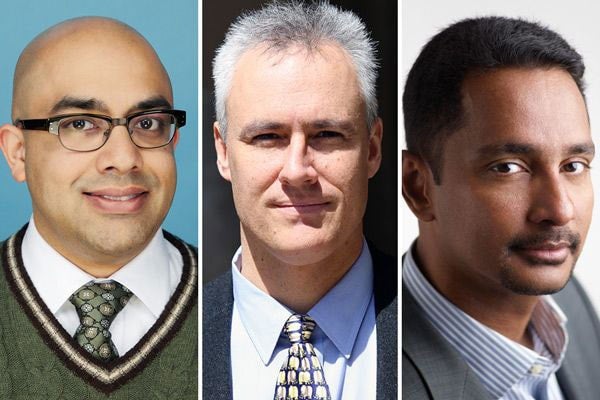
U of T's Guggenheim Fellows: exploring the cosmos, colonial France, Islamic law
Published: April 17, 2014
They are renowned scholars with dramatically divergent fields of research and teaching – so what do these experts in sharia law, the escape of European refugees to Martinque during the Second World War or astronomy have in common?
Meet the University of Toronto’s three latest recipients of the John Simon Guggenheim Memorial Foundation Fellowship: Faculty of Law professor Anver Emon, Astronomy professor Ray Jayawardhana and Department of History professor Eric Jennings.
“The Guggenheim is surreal,” said Professor Emon. “It’s a tremendous honour and privilege to have received this grant, and it could not have come at a better time in my research life.
A distinction awarded each year to a select group of leaders in mid-career, the Guggenheim is given on the basis of exceptional scholarship or creativity in the arts, designed to help academics and artists focus on individual projects. A total of 177 awards were given in the US and Canada, representing 56 disciplines at 83 academic institutions.
“These artists and writers, scholars and scientists represent the best of the best,” said Foundation president Edward Hirsch in a statement. “Since 1925, the Guggenheim Foundation has always bet everything with the individual, and we’re thrilled to continue the tradition with this wonderfully talented and diverse group.”
More than 100 Guggenheim fellows have gone on to become Nobel laureates, almost three dozen have become poet laureates and eight have received the Fields medal.
“My Guggenheim project examines the wartime escape of thousands of European refugees to Martinique between 1940 and 1942, and the myriad encounters that resulted, including convergences around Surrealism and Négritude,” said Jennings. “The resulting study will shed light on the Second World War’s intellectual impact, in particular its substantive mark on anti-colonial dynamics, on questions of rescue and exile, and on issues of identity, by way of Négritude and Martinique’s unique context.”
Emon’s research includes the role of Sharia inside and outside the Muslim world, premodern and modern Islamic legal history and theory, and premodern modes of governance and adjudication.
“Learning about Islamic law offers students an opportunity to challenge presumptions about rationality, secularism, and religion,” he said. “For me the study of sharia is not only about studying a historical legal tradition, but about studying it in relation to its Other.
“And a fundamental aim of my work and teaching is to reflect, through the study of sharia, on the difference of our Other and what is required to live together in a context of difference.
The editor-in-chief of Middle East Law and Governance and series editor of Oxford Islamic Legal Studies, Emon researches and teaches across multidisciplinary legal traditions and consults widely for governments, non-governmental organizations and legal advocacy groups. For the academic year 2014-2015 he will be a member of the Institute for Advanced Study in Princeton, New Jersey, one of the world’s top academic centres for theoretical research and intellectual inquiry.
“The field of Islamic law is a growing one, both in the academy and in various regions and communities where Islamic law is either an informal or formal legal reality,” said Emon. “Islamic law informs public debate and policies, not just in Muslim majority contexts but elsewhere even where Muslims are a minority.
“Whether one wants to conform to its dictates or oppose them vehemently, the fact remains that Islamic law has become a lightning rod (for better or worse) for fundamental questions about law, order, governance and the conditions of freedom that maximize fulfillment in the world.”
Jennings’ work in modern French colonial history (1830-1962) has straddled the histories of France, Southeast Asia, Africa, the Indian Ocean and the Caribbean. Like many areas of colonial or postcolonial studies, the field has undergone considerable change and garnered much interest in the past twenty years, said Jennings.
“While much work in Canada has focused on New France, the modern French empire and its postcolonial legacies also lend themselves to fascinating analyses and to myriad global connections,” Jennings said. “My Guggenheim-supported project speaks to many contemporary concerns in history, including migration, cultural movements, resistance, encounter, and diaspora.
“Many of these issues obviously remain highly relevant today.”
Jayawardhana, Canada research chair in observational astrophysics at U of T, uses many of the world’s largest telescopes to explore planetary origins and diversity. He is the coauthor of over one hundred papers in scientific journals and his popular writing has appeared in the Economist, New York Times, Boston Globe, Scientific American, Astronomy, Muse, and elsewhere. His most recent book is Neutrino Hunters: The Thrilling Chase for a Ghostly Particle to Unlock the Secrets of the Universe.
"I've tried to pursue my passion for writing and my enthusiasm for astronomy more or less in parallel, so this recognition is particularly gratifying,” said Jayawardhana. “I'm humbled by the honor, grateful for the support, and excited about the opportunities it brings."



